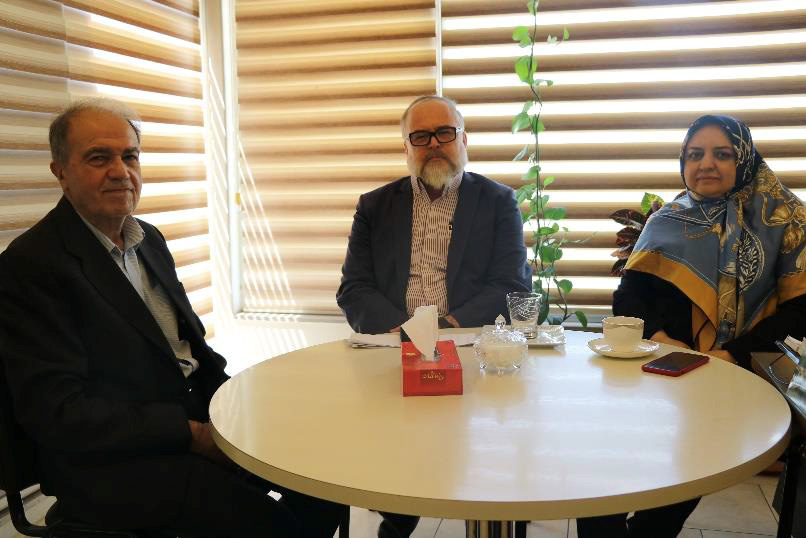
Left to right: (LAS Fellows) Prof. Ali Moosavi Movahedi, Prof. Mohammad Abdollabi and Prof. Shekoufeh Nikfar
ISLAMIC WORLD ACADEMY OF SCIENCES
Newsletter
October 2023- Volume 31- Number 53
Based on the Islamic World Academy of Sciences (IAS) decision, Professor Ali A. Moosavi-Movahedi is designated the IAS Focal Point (Anchor) in Iran. Due to this duty on July 9, 2023, Fellows of the Academy of Sciences of the Islamic World, Dr. Shekoufeh Nikfar, Professor of the Faculty of Pharmacy, Tehran University of Medical Sciences (TUMS), Dr. Mohammad Abdollahi, Professor of the Faculty of Pharmacy, TUMS and member of the IAS Council, and Dr.
Ali A. Moosavi-Movahedi, Professor of Biophysics and head of Institute of Biochemistry and Biophysics (ibb.ut.ac.ir) organized a meeting for recognizing the ways for deep cooperation of the Persian and non-Persian members in the benefit of IAS.
During the meeting, the participants covered the following topics with the aim of advancing the goals of IAS:
1. Identifying new distinguished scientists for the IAS membership and presenting them for consideration to the Selecting Committee of Fellows at the IAS General Assembly.
2. Collaborating on a joint declaration that will outline important issues in the scientific field and publish it in the IAS newsletter.
3. To define a joint scientific/research plan that informs IAS members and Fellows about collaboration topics and introduces study opportunities for academic members and youth scholars from Islamic countries.
4. To engage in joint scientific cooperation regarding research on Halal food products and publish a short article to familiarize IAS members with relevant science.
5. In which fields of science do Iran and neighbor IAS member states lag behind?
6. Which scientific items and member states should progress faster?
During the meeting, the Fellows also discussed the following matters on the basis of the latest seminars in Pakistan (in-person) and Iran (virtual):
- Highlighting the underinvestment in research and development in Muslim-majority countries; it's worth noting that they typically allocate less than 0.5% of their GDP to this area, whereas advanced economies devote five times that amount. Additionally, Muslim countries are estimated to have less than ten scientists, engineers, and technicians per thousand residents, a far cry from the global average of 40 and the developed world's 140.
https://www.weforum.org/agenda/2016/02/how-can-muslim-countries-revive-interest-in-the-sciences/
- Prioritizing science and technology, space, and new developments in IT is crucial to keeping students engaged and up-to-date. Despite progress made by some oil-rich Muslim countries in areas like airport and railway management, they still rely heavily on Western or Chinese assistance to keep pace with the latest advancements. To achieve the strategic goals outlined in the 15-year vision of empowering Muslims in science and technology, coordination between Islamic countries and targeted communities is essential.
We, Fellows of Iran, emphasized progress in the following fields of science in the next 5 years:
1. Providing Halal food products for all Muslim countries.
2. Drug design and development.
3. Digital health and artificial intelligence.
4. Perfect immunization for all people.
5. Virtual education for all people.
6. Perfect transportation for all.
7. Taking decisive measures to curb air and environmental pollution.
8. To increase awareness about the impact of climate change and environmental pollution on human diseases from various aspects.
9. Extend popularization of science.
Indeed, underdeveloped and developing countries need to progress at a faster pace than others. To see which countries, lag behind science development, we can use indices available at http://data.uis.unesco.org and/or https://www.imf.org/en/Data
On these websites, you can rank Islamic regions based on many factors related to science and technology, the most important of which are, Gross domestic expenditure on research and development (GERD). GERD by field (agricultural and veterinary sciences, engineering and tech, humanities and art, natural sciences, medical and health sciences, and social sciences), GERD by activity (applied research, basic research, experimental development), the total number of researchers, and many more factors: http://journal.iiwfs.com/article 130909.html?lang=en
https://www.embopress.org/doi/full/10.15252/embr.201643517
Education and Scientific Development in the OIC Member Countries 2016:
https://www.sestic.org/publications-detail.php?id=395
The Atlas of Islamic World Science and Innovation Final Report:
https://royalsociety.org/~/media/policy/projects/atlas-islamic-world/atlas-final-report.PDF